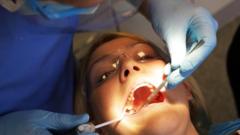NHS Dental Recovery Plan Falls Short of Targets, Watchdog Reports
The £200 million NHS dental recovery plan for England is not progressing as intended, according to the National Audit Office (NAO). The Conservative government’s plan, introduced in February, aimed to increase dental treatments by 1.5 million, bringing the total to 37.1 million in 2024-25. However, the NAO suggests that these goals are unlikely to be met.
The recovery plan included several key strategies to improve dental access. Dentists were offered increased payments for NHS patient treatments, including a £5 raise per unit of activity and a premium payment of up to £50 for seeing patients who hadn’t accessed NHS dental services in two years. Mobile dental vans were also proposed to target areas with the worst dental access.
Despite these efforts, progress has been minimal. By September 2024, while there was a slight increase in dental practices accepting new NHS patients, this hasn’t translated into a significant increase in treatments. Critically, no mobile dental vans have been deployed yet, which were considered a crucial component of improving dental access in underserved areas.
The plan also included longer-term measures such as “golden hellos” – £20,000 incentives to recruit dentists to specific regions over three years – and the Smile for Life scheme targeting children’s dental decay prevention.
Industry experts have been critical of the plan. Shawn Charlwood from the British Dental Association described the recovery plan as “unworthy” and “unambitious,” stating that the policies failed to address the fundamental crisis in NHS dentistry. More than a fifth of dentists currently work exclusively in private practice.
Louise Ansari from Healthwatch England agreed that urgent reform is necessary, describing the NAO’s assessment as revealing “delayed and confused efforts” in addressing dental healthcare access.
The current target of 1.5 million extra treatments would still leave NHS dental activity below the levels seen in 2018-19. Dentists have previously criticized the plan for not providing sufficient motivation to increase NHS work.
Health Minister Stephen Kinnock acknowledged the challenges, stating that the government inherited a recovery plan that was “not fit for purpose” and committed to developing further measures to improve access. He emphasized that rebuilding dentistry will take time.
The NAO report highlights the ongoing challenges in NHS dentistry, noting that the upcoming general election may impact the implementation of recovery strategies. The watchdog urges the next government to carefully consider the long-standing issues in dental healthcare provision.
As it stands, the £200 million rescue package appears to be making limited progress in addressing the significant gaps in NHS dental services, leaving patients and healthcare professionals concerned about the future of dental care in England.




